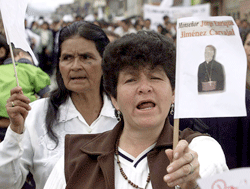A series of arrests for dealing in illegal drugs in the United States and the arrival of Mexican troops in Ciudad Juárez to control violence related to the illegal drug trade have drawn increased attention to the serious problem of drug trafficking, say Latin America’s Catholic bishops. Prelates in several countries have spoken about the problem in recent months. In February, when a district mayor in Lima, Peru, suggested that the Ministry of Health sell controlled doses of drugs to addicts, Archbishop Hector Cabrejos Vidarte of Trujillo called the idea a “serious error,” saying it “would not be good for Peru or for parents, much less youth and children.” Other bishops have expressed concern about the violence and corruption throughout Latin America that results from drug trafficking and have pushed for the creation of a commission headed by three former Latin American presidents—César Gaviria of Colombia, Ernesto Zedillo of Mexico and Fernando Henrique Cardoso of Brazil—that has called for an “in-depth revision” of international drug policies “in light of their enormous human and social costs and threats to democratic institutions.”
Bishops Address Drug-Related Problems
Show Comments (
)
Comments are automatically closed two weeks after an article's initial publication. See our comments policy for more.
The latest from america
What is happening to migrants in courtrooms across the country is a complete embarrassment to the justice system and an affront to human dignity.
Being a kid in the summer is all about existing in an eternal present moment, a feeling of freedom and potential that it will never go away.
Father Thomas Hennen, vicar general of the Diocese of Davenport, Iowa, has been appointed Bishop of Baker, Oregon.
My writing during these past five years is filled with memories of my long journey with God over a lifetime; but very significantly, it is the expression of my prayer at this later time of my life.








